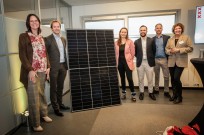- A cleaner sea through well-regulated collection of shipping waste. With that goal in mind, the Port Waste Plan establishes that every seagoing vessel must make a financial contribution to the collection, transportation and processing of shipping waste. A seagoing vessel therefore always pays an environmental charge when calling at seaports within the EU, regardless of whether the vessel will also deliver the ship's waste. The ship's waste is collected by collectors who receive an indirect contribution for this (disposal fee).
Designation of parts of the Minervahaven, Nieuwe Houthaven and Houthaven as an area where, with effect from 16 January 2023, moored ships, on the ground of the Regional Port Bye-laws for the North Sea Canal Area 2019, are prohibited from using a generator and/or operate a main and/or auxiliary engine.
Designation of parts of the Minervahaven, Nieuwe Houthaven, and Houthaven as an area where moored ships, on the ground of the Regional Port Bye-laws for the North Sea Canal Area 2019, are prohibited from using a generator and/or operate a main and/or auxiliary engine.
-

Masdar, one of the world’s leading clean energy companies, Port of Amsterdam, SkyNRG, Evos Amsterdam and Zenith Energy Terminals have signed a memorandum of understanding (MoU) to explore the development of a green hydrogen supply chain between Abu Dhabi and Amsterdam to support Dutch and European markets.
The oil port area as adopted by the Decree of the Director of the Central Nautical Management North Sea Canal Area on 18 August 2021 with number 2021/31 has, due to recent developments, to be adjusted for the areas in the Australiëhaven and Aziëhaven.
-

On February 2, Port of Amsterdam opened the new roof of solar panels on Kopraweg 3 in Amsterdam. The roof consists of 4,911 solar panels, which amounts to a total capacity of 2 Megawatt peak. The sum total of solar panels in the port now amounts to 260,000 square meters.